
The end of summer 2024 will mark an important anniversary in the history of Peekskill and Cortlandt. On August 27 and September 4, it will be 75 years since the Peekskill Riots.
That is the collective name given to two riots started by locals protesting concerts held by the Black performer and civil rights activist Paul Robeson. The first concert was prevented from taking place when the protest escalated into a riot. The rescheduled concert went ahead but attacks on the concertgoers leaving the venue caused a second riot. An international news event at the time, graphic pictures and newsreel footage showed the destruction caused by those angry at Robeson’s presence in Peekskill.
To commemorate the 75th anniversary of these events, Grammy Award-winning bass-baritone Mark S. Doss will give two performances of Here I Stand – a program celebrating the work of Robeson.
The first will be a formal gala at Hollow Brook Golf Club on September 12 at 6 pm. A Sunday matinee will take place on September 15 at 3 pm at the Paramount Hudson Valley Theater.
***
In addition to Doss, the concert will include accounts by speakers whose families attended the 1949 Robeson concerts. All proceeds will be used to establish a scholar’s fund to sponsor public-school curricula, an essay contest, and tuition assistance for students pursuing interdisciplinary careers in social justice.
At the time of his visit to Peekskill, Robeson was one of the most famous performers in the country. A renowned actor and bass-baritone singer, he broke new ground in movies and on the stage as a Black leading man. Having first achieved recognition in the 1910s as a standout football player at Rutgers, he would later achieve many firsts for a Black performer, including being the first to play Othello on Broadway.
In addition to his career as a performer, he was an early campaigner for civil rights and was known for his left-wing beliefs. His 1949 Peekskill concert was planned for Saturday, August 27, in the area then known as Lakeland Acres, which today is part of Hollow Brook Golf Club. Many of the concert’s organizers and attendees were residents of left-wing summer colonies then popular in Northern Westchester and Putnam Valley.
***
The start of the Cold War had elevated tensions between the Robeson supporters and other Peekskill residents. Many of the latter disagreed with the staging of a concert by a performer who had been so vocal in his support of the Soviet Union; this was in the early years of the Cold War when communism was widely seen as an existential threat to the United States.
On the day of the concert protesters crowded the highway that led to the concert site. Estimates on their numbers vary but they were likely in the thousands. As concertgoers arrived, they were subjected to anti-Black, antisemitic, and anticommunist taunts.
Around dusk, 30 protesters muscled their way past the security guards into the concert site. They were followed by hundreds more and soon a riot started. Because of the riot, the concert could not proceed as planned.
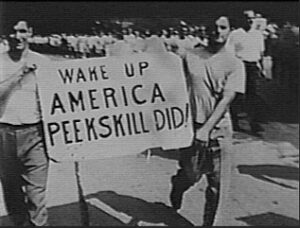
Robeson arranged a second concert to take place the following weekend. Tensions were high after the riot and protesters hung a banner in downtown Peekskill that read “Wake Up America, Peekskill Did.” The intended message was that the protesters were correct in violently attacking the first concert.
***
Supporters of Robeson were also galvanized by the August 27 riot – the attendance at this second concert would be over 15,000. Additional security was organized in the hopes of protecting both the performers and concertgoers. And there was also a considerably larger police presence – 750 officers versus only 6 for the first concert.
The concert proceeded without incident and concluded in the late afternoon with Robeson singing his most famous song: Ol’ Man River. However, as the concertgoers left the site, their cars and buses were ambushed by approximately 3,500 protesters who threw rocks and once again yelled anti-Black, antisemitic, and anticommunist taunts. According to newspaper reports, a total of 150 people were injured, and Peekskill Hospital treated 30 for wounds.
Wendy Talio, a resident of Cortlandt Manor, is one of the organizers of the anniversary events to commemorate Robeson’s 1949 visit to Peekskill. She says that “Robeson was a towering figure known around the world both for his artistry and activism. Despite national recognition for his contributions to civil rights, relatively few locals are aware of him or that these events took place in our own backyard. We’ve come a long way since those days, and we all know there is still a long way to go. Our hope is that this commemoration will bring healing to the community and inspire commitment to a better future.“
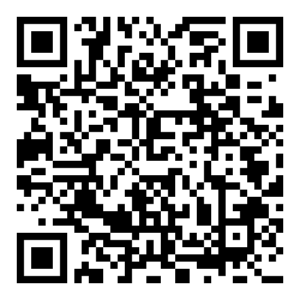
For further information, including event sponsorship opportunities, contact Wendy Talio at info@robeson-in-peekskill.org or scan QR code.
Sources and Further Reading…
Curran, John J. Peekskill’s African American History: A Hudson Valley Community’s Untold Story. History Press, 2008.
Chandler, Russ. Hold the Line: Echoes of the Peekskill Riots. London: Redwords, 2020.
Rorty, James. “The Lessons of the Peekskill Riots: What Happened and Why,” Commentary Magazine, October 1, 1950. https://www.commentary.org/articles/james-rorty/the-lessons-of-the-peekskill-riotswhat-happened-and-why.
Trevor Noble holds a master’s degree in public history from SUNY Empire State University. He is the creator of the Peekskill History Smartphone App and its associated Instagram account: @peekskill_history.



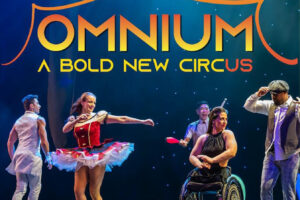
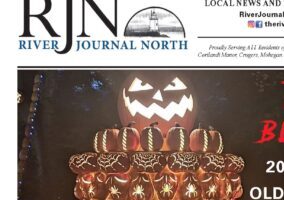
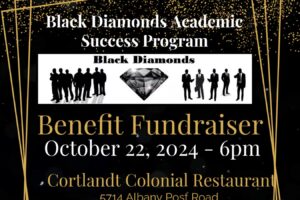
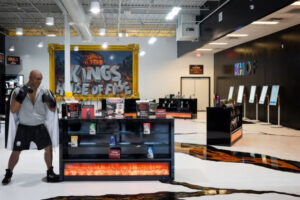

I would like to know why Mr. Noble chose to not reference a critical FACT. The police collaborated with the anti-communist rioters. In fact, at the second riot “law enforcement “ forced the concert attendees to follow an exit route that led them into the location of the rioters. This scenario was pre-planned with the collusion of the police. An inconvenient fact which I ask Mr Noble to refute. SHAME on you for re-writing this disgusting history
Mr Noble is not leaving out any information. The concert goers were told to exit via the only roads available at that time (Oregon Road towards PV, Oregon Road towards Peekskill, and Red Mill. Westbrook did not exist yet.) There were rioters on all roads leading away from the concert grounds. While police certainly abused their power, there were no other exits for the concertgoers to drive through. Rioters were all over the area. Mr Noble is not rewriting any history. Consult Violence in Peekskill by the ACLU and Howard Fast’s Peekskill USA for the correct clarification on this point.